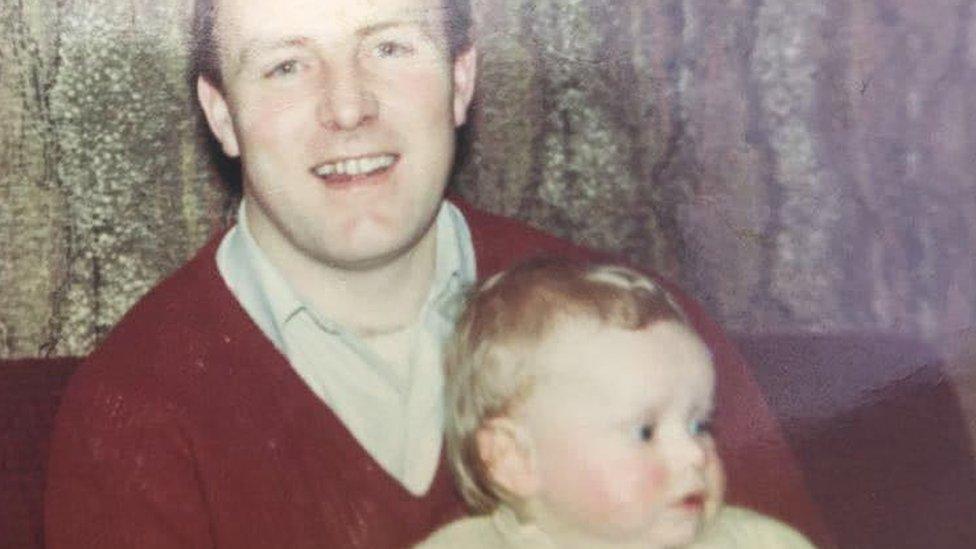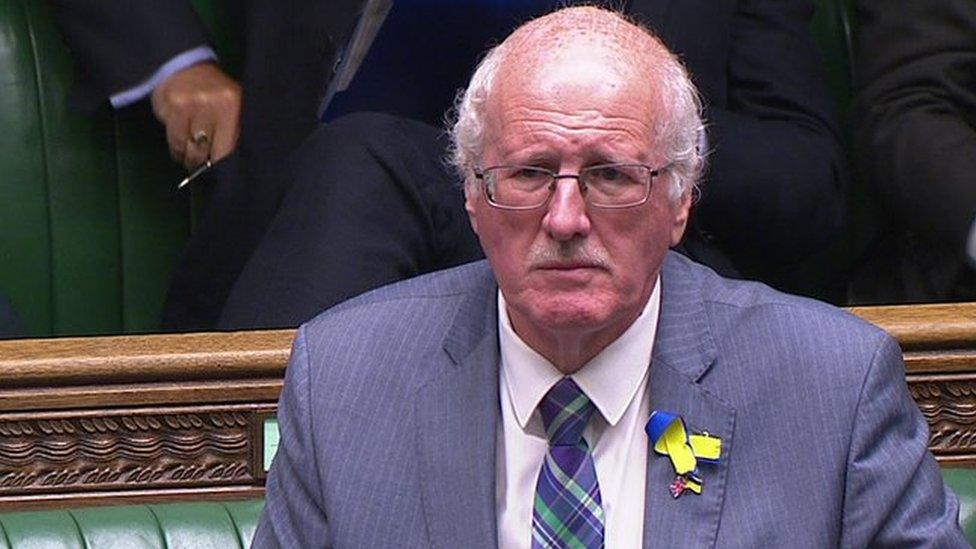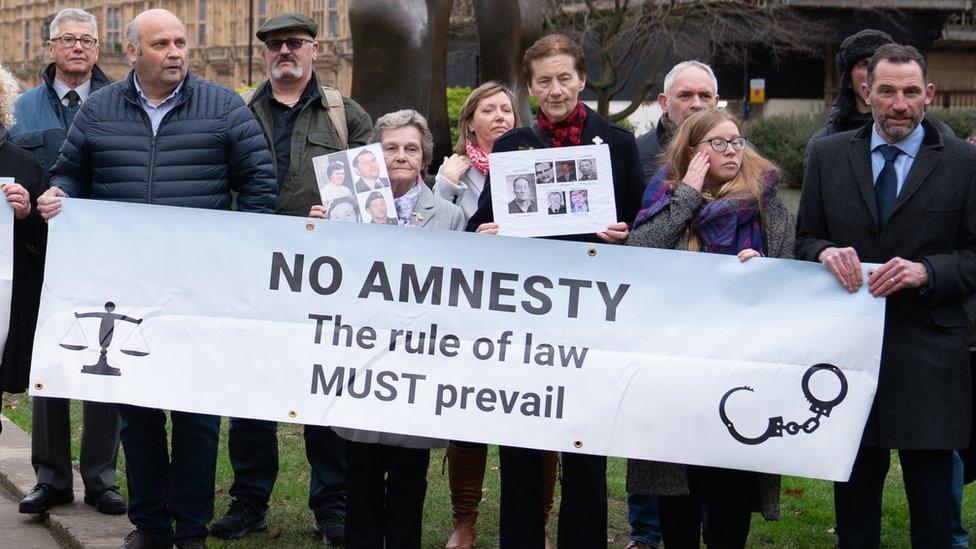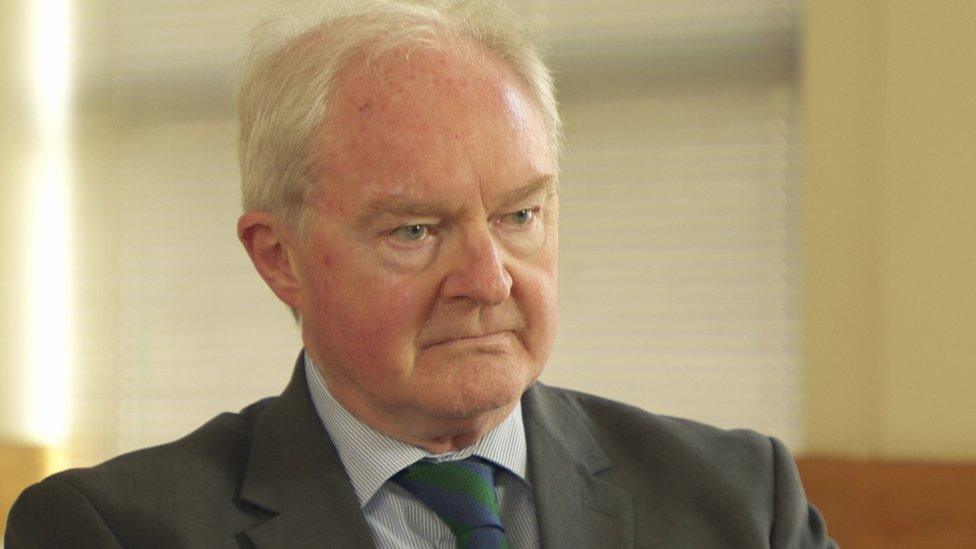Troubles legacy bill: Jim Loughrey's family consider legal challenge
- Published

Jim Loughrey, pictured with son Johnny, was shot in front of his family in Greysteel County Londonderry in 1976
The family of a man killed by loyalist paramilitaries has said they are considering legal action over the UK government's controversial legacy bill.
The bill would end Troubles-era cases and inquests, and offer a conditional amnesty to those accused of killings.
MPs voted on Tuesday in favour of reinstating an immunity clause for those who cooperate with investigations under a new information recovery body.
Jim Loughrey was shot at his home in County Londonderry by the UDA in 1976.
The father of eight had just returned from Mass with his family when loyalist paramilitaries entered his Greysteel home and shot him in front of his wife and children.
His son, Johnny Loughery, said he has "no confidence" the Northern Ireland Troubles (Legacy and Reconciliation) Bill will get their family justice.
Speaking on Tuesday ahead of the bill reaching its third and final stage through Parliament, Northern Ireland Secretary Chris Heaton-Harris said that while it is not perfect, families could use the bill to get information.
He said that the government believed it was "the best mechanism by which we can generate the greatest volume of information in the quickest possible time to pass onto families and victims".
Northern Ireland Office minister Lord Caine told Good Morning Ulster on Wednesday that the bill is a realistic assessment of what can be delivered for victims and survivors but understands the views of those who were opposed to it.
"I do appreciate that this is incredibly difficult and challenging legislation," he said, adding that "this is very difficult and involves some finely balanced political and moral judgement".

Johnny Loughery says many questions remain over his father's killing and his family want accountability
Mr Loughrey told BBC's The North West Today programme about the night his family watched him killed in front of them.
"There was a knock on the door and two men came in, they were armed, and essentially just followed him around the house shooting as he tried to get away." Mr Loughrey said.
"Something that all of us witnessed, because we were in the kitchen area, and he ran into the kitchen area to try and get away.
"They followed him and shot him multiple times, he didn't survive his injuries.
"I was nine and there's no other way to describe it but it was complete mayhem.
"I think we were just lucky none of us [the rest of the family] were injured, the bullets were flying everywhere, completely indiscriminate shooting on the night.
"It takes a long, long time to get over the trauma of it - it really scars you for life."
He said he particularly felt for his widowed mother who, at the young age of 34, was left with eight children and very little money.
No one has ever been charged or convicted of his father's killing, with Mr Loughrey saying their family have never felt they have had any answers or justice.
Mr Loughrey said the passing of the legacy bill would take their case away from the current Ombudsman investigation and into the new Independent Commission for Reconciliation and Information Recovery (ICRIR).
MPs in the House of Commons voted in favour - 292 to 200 - on Tuesday of reinstating the amnesty to those who cooperate with investigations under the new ICRIR body.
"That vote effectively means if we were to have a full investigation and there were recommendations for prosecutions then no one would ever be held accountable," Mr Loughrey said.
"That is horrendous, it's beyond horrendous".
Mr Loughrey said that if the bill is put into law it would be "highly unlikely" that his family would engage with the new commission.
"There's very limited involvement for the families in the new process as far as we can see and there is a high likelihood of very little success," he said.
"We will consider [legally] challenging [the bill], we have to, its not like we want another legal process, we don't have time for that, but what other choices do we have."
- Published18 July 2023

- Published8 June 2023

- Published18 July 2023

- Published12 June 2023
